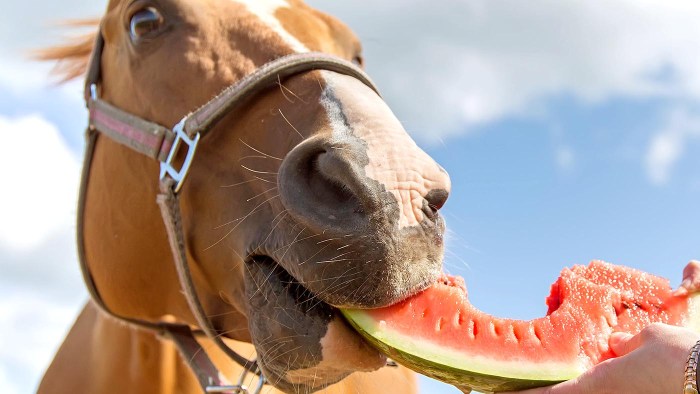Can horses have watermelon? This question may seem simple, but the answer is more complex than you might think. Watermelon is a delicious and refreshing fruit that is packed with nutrients, but it can also be harmful to horses if it is not fed properly.
In this article, we will explore the nutritional value of watermelon for horses, how to safely feed watermelon to horses, and the potential risks associated with overconsumption. We will also provide a list of FAQs about can horses have watermelon and their concise answers, which are commonly asked and not found in the Artikel.
Nutritional Value of Watermelon for Horses
Watermelon is a nutritious fruit that can provide several health benefits for horses. It is a good source of water, which is essential for hydration, especially during hot weather or strenuous exercise. Watermelon also contains vitamins A, C, and B6, as well as minerals such as potassium, magnesium, and phosphorus.
Vitamins and Minerals
Vitamin A is important for vision, immune function, and skin health. Vitamin C is an antioxidant that helps protect cells from damage. Vitamin B6 is involved in energy metabolism and the production of red blood cells. Potassium is an electrolyte that helps regulate fluid balance and muscle function. Magnesium is important for bone health and nerve function. Phosphorus is essential for bone and teeth formation.
Potential Health Benefits
In addition to its nutritional value, watermelon may also have several potential health benefits for horses. The high water content can help keep horses hydrated, which is especially important during hot weather or strenuous exercise. The antioxidants in watermelon may help reduce inflammation and protect against cell damage.
Concerns and Limitations
While watermelon is a healthy treat for horses, there are a few potential concerns to keep in mind. The high sugar content in watermelon can be a concern for horses with certain health conditions, such as equine metabolic syndrome. Additionally, the seeds in watermelon can be a choking hazard, so it is important to remove them before feeding watermelon to horses.
Overall, watermelon can be a healthy and nutritious treat for horses in moderation. Its high water content, vitamins, and minerals can provide several health benefits. However, it is important to be aware of the potential concerns and limitations before feeding watermelon to horses.
Safe Consumption of Watermelon by Horses: Can Horses Have Watermelon

Horses can enjoy the sweet taste of watermelon in moderation as a refreshing treat. However, it’s crucial to follow specific guidelines to ensure their safety and prevent any potential digestive issues.
Recommended Amounts and Frequency
The recommended amount of watermelon for horses is approximately 1-2 slices (about 2-4 pounds) per day. This amount can be divided into smaller portions and offered throughout the day to prevent overconsumption.
Horses can indeed indulge in the sweet, juicy flesh of watermelon, a refreshing treat on a scorching summer day. But what to do with the remaining rind, often discarded as waste? For those seeking culinary adventures, the watermelon rind holds a treasure trove of possibilities.
From tangy pickles to refreshing coolers, a myriad of recipes await exploration, as detailed in this comprehensive guide: what to do with watermelon rind . So, next time you relish a slice of watermelon, remember that the rind too can embark on a culinary journey, transforming into a delectable treat for both horses and humans alike.
Proper Preparation
Before offering watermelon to your horse, it’s essential to remove the seeds and rind. Seeds can be a choking hazard, while the rind is difficult to digest and can cause discomfort.
Just like horses, who relish the sweet and juicy taste of watermelon, chickens too have a curious palate. Their omnivorous nature extends to this summery fruit, making it a delightful treat for them. If you’re curious about whether your feathered friends can indulge in watermelon, explore can chickens eat watermelon to learn more.
Returning to our equine companions, horses can safely enjoy watermelon as a refreshing snack, provided it’s offered in moderation.
Potential Risks of Overconsumption, Can horses have watermelon
Excessive consumption of watermelon can lead to digestive upset in horses, including colic, a serious condition that requires immediate veterinary attention. Signs of colic include abdominal pain, rolling, and pawing at the ground.
Can horses have watermelon? Absolutely! But, like any treat, moderation is key. But once cut, how long is watermelon good for? Check out this article to find out how to store your cut watermelon properly and keep it fresh for longer.
So, next time you’re enjoying a slice of watermelon, share a bite with your equine friend!
Integration of Watermelon into Horse Diets
Incorporating watermelon into horse diets requires careful consideration of factors such as age, activity level, and overall health. It can be offered as a treat or as part of a balanced meal, providing nutritional benefits while encouraging hydration.
For horses with an average activity level, a small slice of watermelon (approximately 1-2 cups) can be given as a treat 2-3 times per week. As a part of a balanced meal, watermelon can replace a portion of hay or grain, adjusting the amount based on the horse’s individual needs and caloric requirements.
While it’s known that horses can indulge in the sweet flesh of watermelon, a question arises: can they savor its rind as well? Just as we humans ponder whether the rind of a watermelon holds culinary value, can you eat the rind of a watermelon ? The answer lies in exploring the nutritional composition and potential risks associated with this unique part of the fruit, ensuring the well-being of our equine companions.
Potential Benefits of Watermelon for Horses
Watermelon offers several potential benefits for horses, including:
- Low-calorie treat: Watermelon is a low-calorie treat, making it suitable for horses that need to maintain a healthy weight or those prone to weight gain.
- Hydration: Watermelon is high in water content, which can help encourage hydration, especially during hot weather or after strenuous exercise.
Alternative Fruits for Horses

In addition to watermelon, several other fruits can provide nutritional benefits for horses. However, it’s crucial to consider their specific nutritional profiles and potential drawbacks before incorporating them into the diet.
Can horses have watermelon? It’s a question that can lead to a fruitful discussion. When the sweet, juicy fruit is in season ( learn more about the ideal time to harvest watermelon ), it’s a treat that can also benefit your equine friend.
But remember, moderation is key when it comes to feeding horses watermelon.
The following table compares the nutritional value of watermelon to other commonly fed fruits:
| Fruit | Calories | Sugar (g) | Fiber (g) | Vitamin C (mg) | Potassium (mg) |
|---|---|---|---|---|---|
| Watermelon | 30 | 6 | 0.4 | 12 | 110 |
| Apples | 52 | 10 | 2.4 | 14 | 107 |
| Carrots | 25 | 5 | 2.8 | 5 | 200 |
| Bananas | 89 | 12 | 2.6 | 10 | 422 |
Potential Benefits and Drawbacks:
- Apples: High in pectin, a soluble fiber that aids digestion and supports gut health. However, they contain more sugar than watermelon, so moderation is key.
- Carrots: Rich in beta-carotene, an antioxidant that supports eye health. They also provide fiber and are low in sugar.
- Bananas: High in potassium, an essential mineral for muscle function. However, they are also high in sugar and should be fed sparingly.
Safe Incorporation:
When introducing alternative fruits into a horse’s diet, start with small amounts and gradually increase the quantity as tolerated. Monitor your horse for any signs of digestive upset or other adverse reactions. Fruits should always be washed thoroughly before feeding.
Summary

Watermelon can be a healthy and refreshing treat for horses, but it is important to feed it in moderation. Overconsumption of watermelon can lead to digestive upset or colic. If you are unsure about how much watermelon to feed your horse, it is always best to consult with a veterinarian.
FAQs
Can horses eat watermelon seeds?
No, horses should not eat watermelon seeds. Watermelon seeds can contain toxins that can be harmful to horses.
Can horses eat watermelon rind?
No, horses should not eat watermelon rind. Watermelon rind is tough and difficult to digest, and it can cause digestive upset in horses.
How much watermelon can I feed my horse?
The amount of watermelon you can feed your horse will depend on the size of the horse and its overall health. A good rule of thumb is to feed no more than 1 pound of watermelon per 100 pounds of body weight per day.






